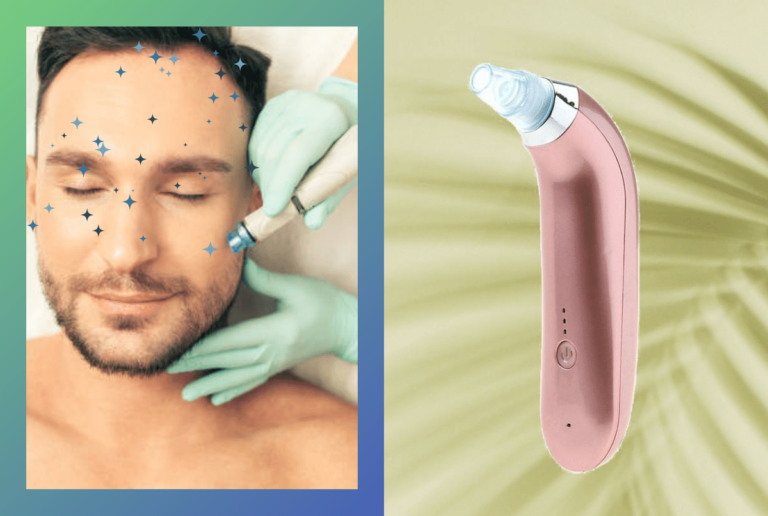Can Weight Loss Cause Acne?
Embarking on a weight loss journey can bring about significant changes, not just in your physique but also in your skin’s health.
It’s not uncommon to notice changes in your skin condition, including acne, as you lose weight. This might leave you wondering if there’s a link between your weight loss efforts and sudden skin issues.
Well, we’ll be going over:
- How does the process of losing weight potentially impact your skin’s health, particularly concerning acne?
- What specific changes during weight loss could contribute to skin breakouts?
- Are there strategies to pursue weight loss without negatively affecting your skin?
Let’s dive in.

Connection between weight loss and acne
When you embark on a weight loss journey, your body undergoes several changes, including hormonal fluctuations. These hormonal shifts can directly impact your skin’s health. During weight loss, your body might increase its androgen levels, hormones that can lead to more oil production in your skin. This excess oil can clog pores, resulting in acne.
Another factor to consider is the detoxification process. Your body releases toxins stored in fat cells during weight loss. While this is a positive health outcome, it may temporarily worsen skin conditions, including acne, as toxins affect your skin’s clarity.
Diet changes, often part of a weight loss plan, also play a crucial role. Suddenly altering what you eat can stress your body, including your skin. If your new diet lacks essential nutrients or if you’re cutting out certain food groups, you might see an impact on your skin health.
Your skin’s appearance and health reflect your body’s internal changes. Maintaining a balanced diet and staying hydrated are key to support both your weight loss and skin health goals.
The role of hormones in acne breakouts during weight loss
When you embark on a weight loss journey, your body undergoes various hormonal changes that can directly impact your skin health. One of the key players in this phenomenon is androgens, male hormones present in both men and women. As you lose weight, your body’s androgen levels may increase. Increased androgen levels are known to stimulate the oil glands in your skin, leading to an overproduction of oil. This excess oil can clog pores and create the perfect environment for acne breakouts.
Furthermore, weight loss can trigger stress responses in the body, leading to the release of cortisol, another hormone. Elevated cortisol levels can further amplify oil production in your skin, exacerbating acne issues. While these hormonal fluctuations are a natural part of the weight loss process, understanding their impact can help you take proactive steps to mitigate their effects on your skin.
Maintaining a consistent skincare routine and managing stress through practices like meditation and regular exercise can be beneficial. Additionally, consulting with a dermatologist can provide tailored advice to help you navigate the complex relationship between weight loss, hormones, and skin health.
The impact of diet changes on acne-prone skin
When you embark on a weight loss journey, altering your diet is typically the first step. While this is crucial for shedding pounds, it’s important to understand how these changes can affect your skin, especially if you’re prone to acne.
Switching up what you eat influences your body’s hormonal balance. Diets high in sugar and refined carbs can increase insulin levels, leading to an overproduction of skin oils. Similarly, dairy products have been shown to impact hormone levels and potentially worsen acne conditions.
In contrast, incorporating foods rich in omega-3 fatty acids, antioxidants, and vitamins can support skin health. Foods like salmon, leafy greens, and berries work to reduce inflammation and promote a clear complexion.
Remember, hydration is key. Reducing your calorie intake often means cutting out certain drinks and foods that contain water. Staying hydrated is essential for maintaining skin elasticity and preventing dryness, which can exacerbate acne.
Balancing your diet with nutrient-rich foods and ample water intake is vital in managing your skin’s health during weight loss. Make adjustments gradually and observe how your skin responds, tweaking your diet as needed to ensure both your body and skin are getting the nourishment they require.
Managing stress during weight loss to prevent acne flare-ups
Embarking on a weight loss journey can be a source of stress, which, in turn, can trigger acne outbreaks. Stress causes your body to produce more of the hormone cortisol, leading to increased oil production in your skin. Keeping stress levels in check is crucial for both your mental well-being and your skin health.
Incorporating stress-reducing activities such as yoga, meditation, or even regular brisk walks can significantly lower your stress. These practices not only help in managing cortisol levels but also improve your overall fitness, contributing to your weight loss ambitions.
Another effective strategy is ensuring you get plenty of restful sleep. Lack of sleep can increase stress hormones, adversely affecting your skin’s clarity. Aim for at least 7-8 hours per night to help your body recover and rejuvenate.
Remember, managing stress isn’t just about reducing the risk of acne. It’s a critical component of a healthy lifestyle that supports both your physical and mental well-being during the demanding process of losing weight. Engaging in activities that you find calming and balancing your workload can create a positive impact on your weight loss journey and help prevent acne flare-ups.
Skincare tips for maintaining clear skin during weight loss
As you embark on your weight loss journey, it’s vital to give your skin the attention it deserves. Fluctuations in your body can impact your skin’s health, but with the right skincare routine, you can maintain clear, radiant skin.
Firstly, ensure you’re cleansing your face twice a day to remove excess oil and impurities. Opt for a gentle, non-comedogenic cleanser that won’t clog your pores. It’s also crucial to exfoliate regularly but gently. Exfoliating helps to remove dead skin cells that can lead to blocked pores and acne outbreaks. However, overdoing it can irritate your skin, so limit this to once or twice a week.
Moisturizing is non-negotiable, even if your skin feels oilier than usual. Choose a lightweight, oil-free moisturizer to keep your skin hydrated without adding to oil production. Hydration is key to maintaining elasticity and preventing dryness.
Another important aspect is sun protection. Always apply a broad-spectrum SPF before heading outdoors. Sun damage can exacerbate acne marks and lead to premature aging. Protecting your skin from harmful UV rays is a critical step in any skincare routine.
Incorporate products with salicylic acid or benzoyl peroxide if you’re prone to acne. These ingredients can help to prevent breakouts by targeting acne-causing bacteria and keeping pores clear. However, listen to your skin and adjust products as needed—what works for one person might not work for another.
Remember, your skin’s needs may change as your body changes. Keep a close watch on how your skin reacts and be willing to adjust your routine. By taking proactive steps to care for your skin, you’ll not only support your weight loss goals but also achieve a clearer, healthier complexion.
Conclusion
Embarking on a weight loss journey can bring unexpected changes to your skin, notably acne. It’s clear that hormonal fluctuations, diet changes, and stress play significant roles in this process. By focusing on a balanced diet rich in nutrients, staying hydrated, and managing stress through relaxation and exercise, you can support both your weight loss and skin health goals.
Remember, maintaining a consistent skincare routine is just as important. If acne persists, don’t hesitate to consult a dermatologist for personalized advice. Weight loss and clear skin are achievable; it’s all about finding the right balance for your body.
Keep these tips in mind, and you’re well on your way to a healthier, more confident you.






